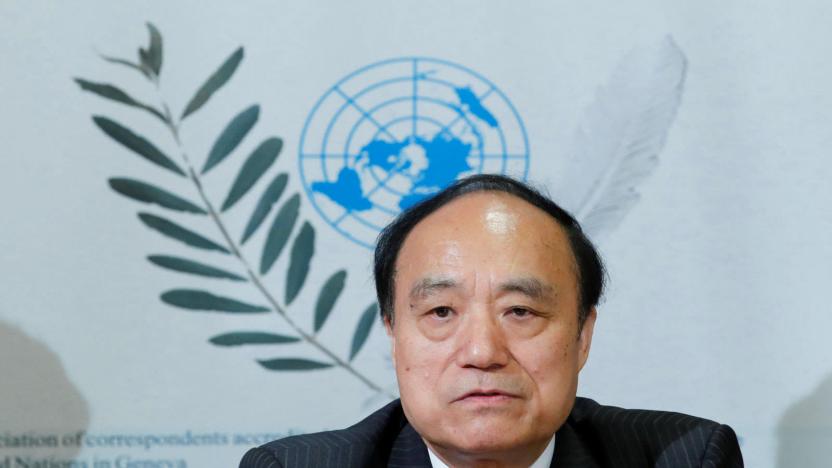united nations
Latest

UN claims North Korea hacks stole $2 billion to fund its nuclear program
United Nations experts say they are formally investigating at least 35 instances of cyberattacks by North Korea in 17 countries, believed to be carried out in a bid to fund its nuclear program. According to a report seen by Associated Press, North Korea has acquired as much as $2 billion from increasingly sophisticated cyber activities against financial institutions and cryptocurrency exchanges.

UN: Misuse of land and agriculture is driving climate change
Human beings must change the way we eat and grow our food in order to avert climate change, says a new report from the UN released today. The study breaks down how much harm increased agricultural production -- from farms to cattle ranches to plantations -- is doing to our planet. All together, activities like deforestation, raising livestock and overusing fertilizer in croplands is generating about a third of greenhouse gas emissions. Burning fossil fuels -- either through factories, electricity or transportation -- contributes more than 60 percent.

UN study finds female voice assistants reinforce harmful stereotypes
For the record, the appropriate response to being called a slut isn't, "I'd blush if I could." But that's what Siri is programmed to say. According to a report by the United Nations, the fact that most voice assistant are gendered as young women is reinforcing harmful stereotypes that women are docile and eager to please, even when they're called lewd names.

UN chief warns nuclear waste could be leaking into the Pacific
A UN chief is concerned that a Cold War-era nuclear 'coffin' could be leaking radioactive material into the Pacific. The concerns are both alarming and oddly similar to the plot of Shin Godzilla -- including the part about it being the US's fault.

UN says US fears over Huawei’s 5G are politically motivated
The secretary general of the UN's internet and telecoms agency has suggested US concerns about 5G networks built using Huawei equipment have more to do with politics and trade, rather than legitimate worries over security. "There is no proof so far," Houlin Zhao, head of the International Telecommunication Union, said regarding claims about Huawei's security. He noted it's in telecoms' best interests to make sure their infrastructure is secure as they might otherwise feel the wrath of authorities.

How NASA will defend the Earth against plagues from outer space
In the summer of 1957, the Earth stood witness as a meteorite cratered in rural Pennsylvania, bringing with it a people-eating plague never seen: an alien amoeba with the taste for human flesh. While we had Steve McQueen around for the first invasion, humanity is now defended against microbial marauders from outer space by NASA and its international counterparts.

Will we be able to control the killer robots of tomorrow?
From ship-hunting Tomahawk missiles and sub-spying drone ships to semi-autonomous UAV swarms and situationally-aware reconnaissance robots, the Pentagon has long sought to protect its human forces with the use of robotic weapons. But as these systems gain ever-greater degrees of intelligence and independence, their increasing autonomy has some critics worried that humans are ceding too much power to devices whose decision-making processes we don't fully understand (and which we may not be entirely able to control).

International Telecommunication Union: worldwide mobile subscriptions hit six billion in 2011
Last year, the UN's International Telecommunication Union (ITU) told us there were five billion mobile subscriptions worldwide at the close of 2010, and now it's reporting that at the end of 2011, that figure hit a staggering six billion. China and India account for one billion a piece, and it brings us ever closer to having the equivalent of one subscription for every person on the planet. (According to the CTIA, there are already more cellular plans in the US -- around 322 million -- than there are inhabitants.) In a stat-heavy release from the ITU, it also ranked the most advanced telecoms countries, with South Korea placing first, Japan eighth and countries in Europe filling the remaining spots. Interestingly, the number of global mobile broadband subscriptions now outnumbers fixed ones by two to one, and mobile internet services showed the biggest growth rates in 2011: 40% worldwide and 78% in developing markets. The ITU attributes the latter figure to the relatively high price of fixed access in these countries, and the increasing availability of mobile alternatives. The CTIA also commented on mobile broadband use, reporting that from July 2011 to June this year, Americans consumed 104 percent more data -- no doubt due, in part, to people taking advantage of expanding 4G coverage. As usual, we've given you the cheat sheet, so if you'd like the full reports and have got a thing for statistics, there's plenty more in the source links below. [Image credit: Chris Jordan]

ITU roundtable narrows scope of debate around standard-essential patents, doesn't create world peace
The ITU's roundtable discussing the controversy over standard-essential patents has wrapped up its first day, and surprise -- there wasn't immediate harmony. While strict press rules prevent discussing exactly which companies said what in the Geneva meeting, the UN's telecom agency mentioned that the initial, partly publicized discussions saw a "heated debate" that mostly followed party lines. Certain companies kept to their view that bans over standard-essential patents hurt innovation, while others were adamant that bans were harmless and potentially necessary -- you can probably guess who's on each side. The meeting mostly helped whittle down the subjects for the closed meetings, which should focus on how much of a curb there should be on injunctions as well as the definition of just what the "reasonable" in Reasonable and Non-Discriminatory (RAND) patent licensing terms should mean. ITU officials remain ever the budding optimists, however. They felt that it was tough to leave injunctions "completely unchecked" and that their institution could shape policies, even if it wouldn't get involved with ongoing talks. Legal Officer Antoine Dore also explained to Engadget that his organization wasn't surprised at the uncompromising stances early on and expected the companies involved to open up "a lot more" once they weren't under the watchful eyes of cameras and reporters. If they don't, we suspect other international organizations could exert their own pressure.

ITU wants to bring smartphone makers to peace talks, hash out patent wars
The United Nations defines the stereotype of a peace broker, so it's not that far-fetched to hear that its International Telecommunication Union (ITU) wing is hoping to step in and cool down the rapidly escalating patent world war. The organization plans to convene a Patent Roundtable on October 10th -- in neutral Geneva, Switzerland, of course -- to have smartphone makers, governments and standards groups try and resolve some of their differences. Those mostly concerned about Apple's actions won't be happy with the focus of the sit-down, however. Most of the attention will surround allegations that companies are abusing standards-based patents, which will put the heat largely on a Google-owned Motorola as well as Samsung. Still, there's hope when the ITU's Secretary-General Dr. Hamadoun Touré talks of desiring a "balancing act" between what patent holders want and what customers need. Our real hope is that we don't have to hear talk of customs delays and product bans for a long while afterwards. [Image credit: Patrick Gruban, Flickr]

'Facebook tax' could make web companies pay for usage outside the US
Leaked documents purportedly from the ITU reveal that the body is considering a levy on content-heavy services like Facebook and Netflix to pay for the bandwidth they use outside of the US. Tabled by lobbyists representing Europe's biggest cellphone networks, the proposal suggests that Google and others should shoulder some of the cost of bringing their services to customers in the rest of the world. In response, Cisco VP Robert Pepper has argued that any such charge could cause web services to block queries from developing nations, "effectively cutting them off from the internet." The motion will be discussed at a December meeting of the ITU council, where all 193 member countries will be allowed to vote. [Image Credit: Wikimedia Commons]

Master Chief called in to resolve Syria, reports BBC
During a news segment on the United Nations' involvement in the Syrian conflict, the BBC aired an image of the UNSC – the fictitious United Nations Space Command from Halo.The image, shown in the background of the clip above, even gets a special spotlight as the camera zooms in on the anchor as she discusses the very serious, very real issues plaguing Syria over the past year.The BBC has since acknowledged and apologized for airing the Halo logo, telling Eurogamer, "BBC News makes every effort to ensure the accuracy of all images broadcast, however very occasionally mistakes do happen. Unfortunately an incorrect logo was used during a segment on last week's News at One bulletin and we apologise to viewers for the mistake."The image was not broadcast in our later bulletins."Even if the BBC has stopped airing the USNC logo, the error has of course popped up on YouTube. The most obvious logic behind the mistake is that BBC editors searched Google Images for "United Nations Security Council symbol" and snagged the Halo UNSC logo that popped up in the results, but we like to think it was a subtle message to focus more efforts on quickly appeasing the situation in Syria – more efforts involving Master Chief.

UN: worldwide internet users hit two billion, cellphone subscriptions top five billion
The UN's International Telecommunication Union predicted last fall that the number of internet users worldwide would hit two billion by the end of 2010, and it's now issued its full report that confirms just that -- 2.08 billion, to be specific. As the ITU's Hamadoun Toure notes, that number represents a huge leap from the mere 250 million internet users that existed a decade ago, and it means that roughly one third of the world's population now has internet access of some sort -- of those, 555 million have a fixed broadband subscription, and 950 million have mobile broadband. Just as impressive as that (if not moreso), are the number of cellphone subscriptions worldwide, which has now crossed the five billion mark. That's up from 500 million at the beginning of the year 2000, although the agency notes that it's only accounted for "subscriptions," and not individual users. Any way you slice it, however, that's quite a record of growth for the first decade of the 21st century.

Inhabitat's Week in Green: of mirror cubes and urban icebergs
Each week our friends at Inhabitat recap the week's most interesting green developments and clean tech news for us -- it's the Week in Green. With summer in full swing, this week Inhabitat watched the mercury rise as the world's largest thermostat burst forth with an array of 72,000 building-mounted LEDs. We also kept things cool with a remarkable plan to transform frozen construction sites into event-hosting urban icebergs. And if you haven't made plans for a summer vacation yet, might we recommend this stunning Swedish "Treehotel" housed within a silvery mirror cube in the sky? Heartening news rang forth from the renewable energy sector this week as a UN-backed study reported that the building of new renewable energy plants has officially overtaken fossil fuel plants in Europe and the US. We also took a look at two brand new types of power plants -- the world's first hydrogen-driven power plant in Italy and the first hybrid coal-solar power plant in Colorado. The past week also saw several remarkable advances in clean tech, starting with MIT's latest innovation, a new type of high-tech fiber that can transmit sound, light, and generate electricity. We also paid homage to one of our all-time favorite sources of (surprisingly green) home entertainment - the Roku Box.

United Nations identifies e-waste as an urgent and growing problem, wants change
E-waste might be one of the biggest misnomers in the history of nomery -- the image it creates in the mind is of a bunch of email and document files clogging up your local internet pipes. The reality of it is that electronic waste is rapidly populating ever-growing landfill areas in so-called developing countries (they're poor, just call a spade a spade) and the issue has now garnered the attention of the United Nations. The UN Environment Programme has issued a wideranging report warning that e-waste in China and South Africa could double or even quadruple within the next decade, whereas India could experience a five-fold rise. Major hazards exist in the unregulated and informal recycling of circuit boards and techno gadgets, as processes like backyard incineration for the retrieval of gold generate toxic gases while also being wildly inefficient. The whole point of the report is to encourage some global cooperation in setting up modern and safe recycling facilities in the affected countries to ameliorate the problem, though being generally more careful in our consumption and disposal of electronics wouldn't do the environment's chances any harm either.

Arabic Rappelz to hold International Day Against Drug Abuse and Illicit Trafficking event
Every year on the 26th of June, the world recognizes the International Day Against Drug Abuse and Illicit Trafficking, a campaign begun by the United Nations and first held in 1988. The publishers of the Arabic version of Rappelz, Game Power 7, have issued a press release signifying their involvement in this year's campaign; there will be a one-week "education and awareness" event held in-game that mirrors the UN's sentiments for the day itself.As displayed in the picture above, the international campaign slogans "Do drugs control your life?" and "Your life. Your community. No place for drugs" will be featured in Rappelz for the event. Virtual gifts will also be given away, presumably educational in some form. Game Power 7 stated that using their virtual world to promote good values in the community is part of the company's strategy, so future events of this kind might find their way into the game. To find out more about the International Day Against Drug Abuse and Illicit Trafficking, the best place to start is the UN's official page, which also features links to some nation-specific pages.

UN plans to fight poverty with wireless
The United Nations is taking on the enormous project of supplying wireless service to almost 80 African tribes covering 10 countries. The project is expected to encompass nearly a half-million people from the area and is expected to boost the local economy by providing health care and education. Consumers would also have access to 2G data, giving customers the ability to surf the internet. Even though this doesn't fall under the GSMA 3G for all plan -- something is better than nothing, right?[Via Textually]

United Nations "Internet" Summit held sans internet
Do you lose any and all direction in your life if your internet goes down for more than 20 seconds or so? Sadly, the same goes for us, but imagine the hysteria that ensued when participants realized the United Nations "Internet" summit was completely devoid of web access. Amazingly enough, the one conference where free WiFi was all but guaranteed failed to deliver, as the techies working for the "luxury resort hotel on the Athenian Riveria" couldn't iron out the connectivity issues. The hotspot initially presented the dreaded "could not connect to the network" error, and after repeated troubleshooting efforts were completed in vain, conference organizers apparently gave up on ever finding a solution. So, are you rethinking that decision to pick up one of those snazzy 3G ExpressCards yet?










